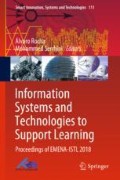Abstract
The flexibility, availability and functionality of online learning environments (OLEs) open up new possibilities for classroom teaching. However, although these environments are becoming increasingly popular, many users stop learning online after their initial experience. This paper aims to develop a new multi-dimensional research model allowing to categorize and to identify the factors that could affect the learning experience (LX) in order to decrease the failure and dropout rate in OLEs. This new model is based on the combination of the major models of user satisfaction and continuity of use (ECM, TAM3, D&M ISS, SRL). The proposed research model consists of 38 factors classified according to 5 dimensions: learner characteristics, instructor characteristics, system characteristics, course characteristics and social aspects.
Access this chapter
Tax calculation will be finalised at checkout
Purchases are for personal use only
References
Castillo-Merino, D., Serradell-López, E.: An analysis of the determinants of students’ performance in e-learning. Comput. Hum. Behav. 30, 476–484 (2014)
Wook, M., Yusof, Z.M., Nazri, M.Z.A.: The acceptance of educational data mining technology among students in public institutions of higher learning in Malaysia. Int. J. Futur. Comput. Commun. 4, 112 (2015)
Davis, F.D.: A technology acceptance model for empirically testing new end-user information systems: Theory and results. Doctoral dissertation. MIT Sloan School of Management, Cambridge (1986)
Venkatesh, V., Davis, F.D.: A theoretical extension of the technology acceptance model: four longitudinal field studies. Manag. Sci. 46, 186–204 (2000)
Venkatesh, V., Bala, H.: Technology acceptance model 3 and a research agenda on interventions. Decis. Sci. 39, 273–315 (2008)
Agudo-Peregrina, Á.F., Hernández-García, Á., Pascual-Miguel, F.J.: Behavioral intention, use behavior and the acceptance of electronic learning systems: differences between higher education and lifelong learning. Comput. Hum. Behav. 34, 301–314 (2014). https://doi.org/10.1016/j.chb.2013.10.035
Bhattacherjee, A.: Understanding information systems continuance: an expectation-confirmation model. MIS Q. 25, 351 (2001). https://doi.org/10.2307/3250921
Chow, W.S., Shi, S.: Investigating students’ satisfaction and continuance intention toward e-learning: an extension of the expectation – confirmation model. Procedia Soc. Behav. Sci. 141, 1145–1149 (2014). https://doi.org/10.1016/j.sbspro.2014.05.193
Lee, M.-C.: Explaining and predicting users’ continuance intention toward e-learning: an extension of the expectation–confirmation model. Comput. Educ. 54, 506–516 (2010). https://doi.org/10.1016/j.compedu.2009.09.002
Alraimi, K.M., Zo, H., Ciganek, A.P.: Understanding the MOOCs continuance: the role of openness and reputation. Comput. Educ. 80, 28–38 (2015). https://doi.org/10.1016/j.compedu.2014.08.006
Halilovic, S., Cicic, M.: Antecedents of information systems user behaviour-extended expectation-confirmation model. Behav. Inf. Technol. 32, 359–370 (2013). https://doi.org/10.1080/0144929X.2011.554575
Hong, J.C., Hwang, M.Y., Szeto, E., et al.: Internet cognitive failure relevant to self-efficacy, learning interest, and satisfaction with social media learning. Comput. Hum. Behav. 55, 214–222 (2016). https://doi.org/10.1016/j.chb.2015.09.010
Oghuma, A.P., Libaque-Saenz, C.F., Wong, S.F., Chang, Y.: An expectation-confirmation model of continuance intention to use mobile instant messaging. Telemat. Inform. 33, 34–47 (2016). https://doi.org/10.1016/j.tele.2015.05.006
Stone, R.W., Baker-Eveleth, L.: Students’ expectation, confirmation, and continuance intention to use electronic textbooks. Comput. Hum. Behav. 29, 984–990 (2013). https://doi.org/10.1016/j.chb.2012.12.007
DeLone, W.H., McLean, E.R.: The DeLone and McLean model of information systems success: a ten-year update. J. Manag. Inf. Syst. 19, 9–30 (2003)
Mohammadi, H.: Investigating users’ perspectives on e-learning: an integration of TAM and IS success model. Comput. Hum. Behav. 45, 359–374 (2015). https://doi.org/10.1016/j.chb.2014.07.044
Ozkan, S., Koseler, R.: Multi-dimensional students’ evaluation of e-learning systems in the higher education context: an empirical investigation. Comput. Educ. 53, 1285–1296 (2009). https://doi.org/10.1016/j.compedu.2009.06.011
Zimmerman, B.J.: From cognitive modeling to self-regulation: a social cognitive career path. Educ. Psychol. 48, 135–147 (2013)
Matzat, U., Vrieling, E.M.: Self-regulated learning and social media – a ‘natural alliance’? Evidence on students’ self-regulation of learning, social media use, and student–teacher relationship. Learn. Media Technol. 41, 73–99 (2016)
Dabbagh, N., Kitsantas, A.: Personal learning environments, social media, and self-regulated learning: a natural formula for connecting formal and informal learning. Internet High. Educ. (2011). https://doi.org/10.1016/j.iheduc.2011.06.002
Al-Samarraie, H., Teng, B.K., Alzahrani, A.I., Alalwan, N.: E-learning continuance satisfaction in higher education: a unified perspective from instructors and students. Stud. High. Educ., 1–17 (2017). https://doi.org/10.1080/03075079.2017.1298088
Müller, N.M., Seufert, T.: Effects of self-regulation prompts in hypermedia learning on learning performance and self-efficacy. Learn. Instr. 58, 1–11 (2018). https://doi.org/10.1016/j.learninstruc.2018.04.011
Author information
Authors and Affiliations
Corresponding authors
Editor information
Editors and Affiliations
Rights and permissions
Copyright information
© 2019 Springer Nature Switzerland AG
About this paper
Cite this paper
Safsouf, Y., Mansouri, K., Poirier, F. (2019). A New Model of Learner Experience in Online Learning Environments. In: Rocha, Á., Serrhini, M. (eds) Information Systems and Technologies to Support Learning. EMENA-ISTL 2018. Smart Innovation, Systems and Technologies, vol 111. Springer, Cham. https://doi.org/10.1007/978-3-030-03577-8_4
Download citation
DOI: https://doi.org/10.1007/978-3-030-03577-8_4
Published:
Publisher Name: Springer, Cham
Print ISBN: 978-3-030-03576-1
Online ISBN: 978-3-030-03577-8
eBook Packages: Intelligent Technologies and RoboticsIntelligent Technologies and Robotics (R0)

